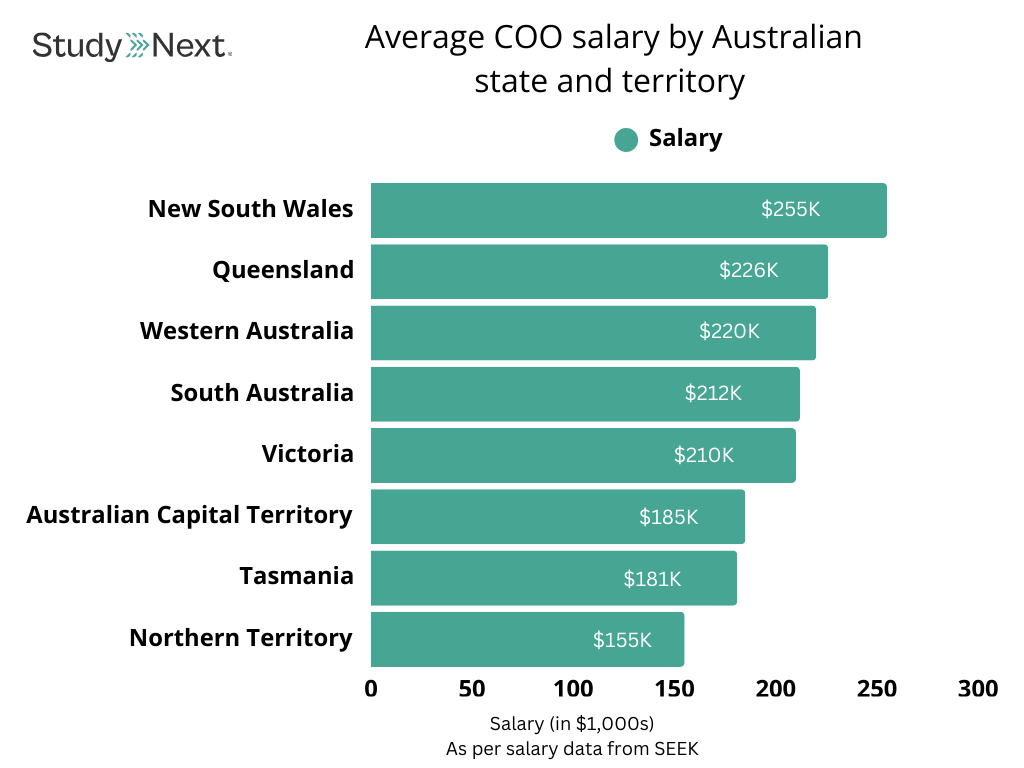
A chief operating officer (COO) is responsible for turning strategic visions into measurable operational outcomes. If you’re aspiring to step into this C-suite position, you may be wondering what the pathway looks like.
In this guide, we delve into the steps to becoming a COO as well as explore their average salary and typical key responsibilities. We also highlight the essential skills you’ll need to succeed in this role.
6 steps to becoming a COO in Australia
The path to becoming a COO in Australia usually involves a relevant educational background and extensive operational leadership experience. You’ll typically start your journey by earning an undergraduate degree, typically in business or a related field. As an aspiring COO, you may also further your qualifications and expertise with a postgraduate degree. Throughout your career, you’ll likely be working in various operational roles before stepping into management and eventually senior leadership positions. Building a strong professional network is also crucial for expanding your opportunities.
Learn more in the following step-by-step guide:
1. Acquire an undergraduate degree
To begin a career in operations, you need to obtain a bachelor’s degree as it’s a typical requirement for many entry-level operational roles. You can consider studying in a field that gives you insight into how businesses function, such as business, business administration, commerce or a related field. If you already have plans to work in a specific sector, such as information technology or engineering, you can choose to pursue a bachelor’s qualification in that area to gain specialised knowledge and skills. This will typically take you three years of full-time study to complete.
Since COOs are responsible for managing operations across different teams, you’ll need to build competence in various business areas like finance, management and supply chain. Studying an undergraduate course that covers these areas helps you gain foundational expertise, preparing you to step into a variety of operational roles after graduation.
2. Gain practical work experience
When you begin your career, you’ll likely explore entry-level roles that give you firsthand exposure to how businesses operate, such as operations administrator, project coordinator and supply chain officer. While your specific duties may vary depending on your role, you’ll typically support your team in contributing to the day-to-day operations. At this stage, you can observe how business processes support organisational goals, which is essential for anyone aiming to lead operational teams.
Once you gain sufficient work experience, you can advance to management positions within operations, such as an operations manager, project manager or operations supervisor. These roles expand your responsibility as you’ll be given more authority in managing people and resources to improve efficiency. They also help you develop vital skills in operational leadership, from managing team productivity to thinking strategically to address operational challenges.
3. Further your qualifications with postgraduate study
Obtaining a postgraduate degree can significantly elevate your career prospects, as many employers favour COO candidates with this qualification, especially a Master of Business Administration (MBA). Studying an MBA helps improve your business acumen across core areas and polish your leadership skills, adding more credibility to your existing professional experience.
Many MBA programs also include units that can hone your operational expertise. For example, the Master of Business Administration at Melbourne Business School features Operations as a core unit, which focuses on the development and management of business processes, including topics like quality, cost, innovation and flexibility. The course also includes the Immersive Business Experience unit, giving you the opportunity to solve real-world business challenges in collaboration with leading partner organisations.


Designed with a focus on practical skills for any business application, the full-time Master of Business Administration (MBA) offers a breadth of knowledge, tools and opportunities to apply what you learn in a real-world setting.
You can choose to study over two years, embracing the full MBA experience or accelerate your pace to move through your subjects quicker, allowing more time for internships, exchange opportunities and career development.
Flexible Length
The program pace can be tailored to match your needs. Study for over two years, embracing the full MBA experience or accelerating your pace to move through your subjects quicker, allowing more time for internships, exchange opportunities, and career development.
Meanwhile, CQUniversity (CQU)’s Master of Business Administration course offers the Operational Management and Business Analytics core unit. Throughout this unit, you’ll explore key principles in operational management such as process planning, quality management, lean thinking and supply chain in modern operations. The unit also teaches you how to leverage financial, market and economic data to make better operational decisions. As an MBA student at CQU, you’re given the option to complete a major to further align your learning experience with your career goals, with options like emergency management, forensic analysis, project management and general management


CQUniversity's world-class Master of Business Administration (MBA) is delivered by highly qualified course leaders with real-world business and public sector experience to support your career advancement. You will study contemporary people management and emotional intelligence models to lead with influence and integrity. Designed for emerging and aspiring leaders, this MBA focuses on developing contemporary people management skills with the know-how to tackle the changing landscape of the public sector, not-for-profit, social and ethical purpose organisations.
Develop your skills and knowledge in a broad range of management and leadership responsibilities, in areas such as strategy, marketing, people management, operations management, economic and change management and choose a major to suit your industry or career goals.
Tailor your MBA to align with your industry or career and choose to major in emergency management, forensic analysis, project management or general management.
Through interaction with academics, colleagues and various members of the business community, you will gain different perspectives and approaches to current and emerging business issues. Contextual learning and reflective practice will form the basis for your personal and professional development, ensuring your learning experience is relevant and practical.
An MBA from CQUniversity allows you to advance your management career and become an influential leader in today's fast-paced and ever-changing environment.
4. Pursue senior-level positions
Many COO roles require you to have substantial experience in leading business operations. According to COO jobs advertised on SEEK, you need to have at least 10 years of senior operational leadership experience to qualify as a candidate. Some roles you may consider before stepping into a COO role include senior operations manager or director of operations.
At this stage of your career, your job scope goes beyond managing processes. You’ll be leading larger teams, driving efficiency across departments and making important business decisions that can impact organisational performance. By gaining experience working in these senior roles, you’ll develop the operational acumen needed to confidently take on a COO role.
5. Build your professional network
As you progress in your career, you’ll find yourself engaging with a wide range of stakeholders inside and outside of your organisation. Networking is an important aspect in building your career, especially as an aspiring COO, as the role involves effective cross-functional collaboration across diverse parts of the business. Connecting with other professionals and industry experts can give you valuable insights to navigate the complexities of the modern business environment and lead to potential collaborations or career opportunities, accelerating your pathway to becoming a COO.
6. Apply for a COO role
With extensive industry experience, you’ll be well-equipped to apply for a COO position in your preferred industry. Demonstrating a proven track record of improving operational performance is essential. You should highlight your achievements in optimising processes, reducing costs and overseeing large teams in your resume and job interviews to reinforce your credibility as a senior leader who’s ready to take on the responsibilities of a COO.
What is a COO?
A COO is a top-level executive responsible for overseeing an organisation’s day-to-day operational activities. Reporting directly to the chief executive officer (CEO), the COO translates the CEO’s vision into operational strategies and provides the leadership needed to execute them effectively. By managing the overall operational planning and strategy, the COO plays a crucial role in keeping the business running smoothly.
Besides working closely with the CEO, the COO collaborates regularly with other C-level executives to design and implement strategies that improve operational efficiency and overall business performance. This professional also often works with department managers in areas like finance, human resources, sales and marketing to maintain cross-functional alignment and ensure operational teams are working effectively towards achieving organisational goals.
COOs are highly valued for their operational leadership expertise within organisations of varying sizes across diverse industries. In Australia, the demand for COO roles is expected to grow by 7.9 per cent within the next five years, highlighting the increasing importance of this leadership role in today’s business landscape.
What does a COO do?
A COO mainly focuses on translating company strategies into daily operations to achieve business objectives. While their exact duties may vary depending on the specific needs of an organisation, this role is typically concerned with optimising business processes and overseeing workforce capabilities. Common responsibilities include:
- Collaborating with C-level executives to develop short and long-term organisational strategies
- Monitoring and maintaining operational quality assurance
- Examining business strategies for operational impacts and risks
- Identifying ways to reduce operating expenses and enhance processes
- Designing programs and guidelines that promote company culture
- Maintaining compliance with occupational health and safety regulations
- Leading operational teams and providing them with the resources they need to execute operational initiatives effectively
- Evaluating and reporting on operational performance metrics
What is a typical COO salary in Australia?
According to SEEK, the average COO salary in Australia ranges from $205,000 to $225,000 per year. Explore the typical annual income for this C-suite role in each state and territory below:

What skills does a COO need?
To thrive in a COO role, you need to develop a combination of hard skills, including operational management, strategic planning and risk management, and soft skills like leadership, communication and problem-solving. Find out more about these COO skills below:
Hard skills
Operational management: As a COO, you need strong expertise in managing and improving operations to keep a business running smoothly. This often includes managing teams across various functions, overseeing supply chains and analysing performance metrics to ensure business operations are aligned with company objectives.
Strategic planning: This skill is essential to perform key responsibilities of a COO, such as developing organisational plans, allocating resources across departments and overseeing cross-functional initiatives. Strategic planning allows you to enhance efficiency, boost collaboration and contribute to the company’s long-term growth.
Risk management: A COO must be adept at identifying and mitigating potential threats in internal operational processes and external environments that can disrupt business performance. This typically involves creating contingency plans and developing resilient frameworks to minimise potential risks.
Soft skills
Leadership: This is a necessary skill for a COO as the role requires you to oversee operations within multiple business departments and ensure cohesive cross-functional collaborations. Strong leadership not only keeps operations running efficiently but also motivates employees to work together towards shared organisational goals.
Communication: As a COO, you’ll interact with diverse stakeholders, including C-suite executives, department heads and external partners. Proficient communication skills allow you to clearly present ideas, build rapport, influence decision-making and guide teams in executing strategies effectively.
Problem-solving: Addressing inefficiencies and challenges in operations is a core part of the COO role. Problem-solving skills enable you to develop practical, data-driven solutions that keep the business competitive and sustainable, while also anticipating obstacles that may affect performance.
Who should become a COO?
An aspiring COO should have strong expertise in both strategic thinking and operational management. If you enjoy bridging the gap between business strategy and daily operational execution, a career path as a COO may be a suitable choice. This C-level role also requires excellent leadership skills to oversee departments and manage cross-functional collaborations. The ability to examine overall business performance and develop strategies that address inefficiencies and improve operational efficiency is also vital for becoming a COO.
If your long-term professional ambition is to play a key role in improving business growth and performance by aligning operations with company goals, you’ll likely find the position of COO both impactful and rewarding to pursue.
Position yourself better for a COO career with postgraduate study
As one of the top executives within an organisation, the COO plays a crucial role in keeping daily operations running seamlessly. Taking on this position typically requires years of operational leadership experience supported by a strong educational foundation. Advancing your qualifications with a postgraduate degree can further elevate your career prospects. Discover a wide variety of postgraduate business courses to get started.























